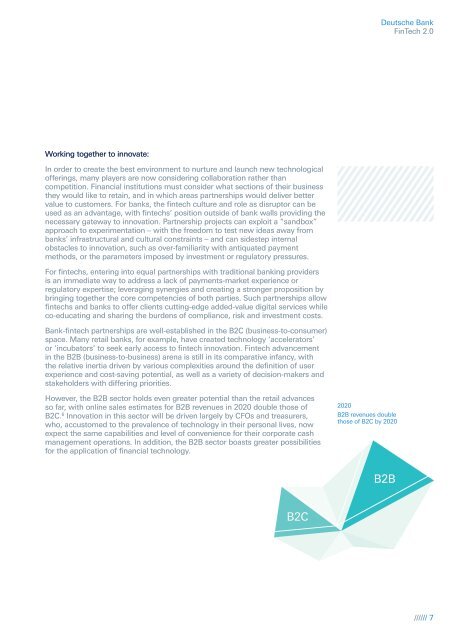FinTech 2.0
YKHHI
YKHHI
You also want an ePaper? Increase the reach of your titles
YUMPU automatically turns print PDFs into web optimized ePapers that Google loves.
Deutsche Bank<br />
<strong>FinTech</strong> <strong>2.0</strong><br />
Working together to innovate:<br />
In order to create the best environment to nurture and launch new technological<br />
offerings, many players are now considering collaboration rather than<br />
competition. Financial institutions must consider what sections of their business<br />
they would like to retain, and in which areas partnerships would deliver better<br />
value to customers. For banks, the fintech culture and role as disruptor can be<br />
used as an advantage, with fintechs’ position outside of bank walls providing the<br />
necessary gateway to innovation. Partnership projects can exploit a “sandbox”<br />
approach to experimentation – with the freedom to test new ideas away from<br />
banks’ infrastructural and cultural constraints – and can sidestep internal<br />
obstacles to innovation, such as over-familiarity with antiquated payment<br />
methods, or the parameters imposed by investment or regulatory pressures.<br />
For fintechs, entering into equal partnerships with traditional banking providers<br />
is an immediate way to address a lack of payments-market experience or<br />
regulatory expertise; leveraging synergies and creating a stronger proposition by<br />
bringing together the core competencies of both parties. Such partnerships allow<br />
fintechs and banks to offer clients cutting-edge added-value digital services while<br />
co-educating and sharing the burdens of compliance, risk and investment costs.<br />
Bank-fintech partnerships are well-established in the B2C (business-to-consumer)<br />
space. Many retail banks, for example, have created technology ‘accelerators’<br />
or ‘incubators’ to seek early access to fintech innovation. Fintech advancement<br />
in the B2B (business-to-business) arena is still in its comparative infancy, with<br />
the relative inertia driven by various complexities around the definition of user<br />
experience and cost-saving potential, as well as a variety of decision-makers and<br />
stakeholders with differing priorities.<br />
However, the B2B sector holds even greater potential than the retail advances<br />
so far, with online sales estimates for B2B revenues in 2020 double those of<br />
B2C. 6 Innovation in this sector will be driven largely by CFOs and treasurers,<br />
who, accustomed to the prevalence of technology in their personal lives, now<br />
expect the same capabilities and level of convenience for their corporate cash<br />
management operations. In addition, the B2B sector boasts greater possibilities<br />
for the application of financial technology.<br />
2020<br />
B2B revenues double<br />
those of B2C by 2020<br />
B2B<br />
B2C<br />
////// 7


